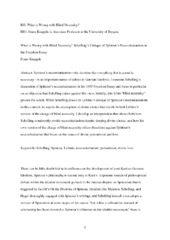What is Wrong with Blind Necessity? Schelling’s Critique of Spinoza’s Necessitarianism in the Freedom Essay
Peer reviewed, Journal article
Accepted version
Permanent lenke
https://hdl.handle.net/1956/21700Utgivelsesdato
2019Metadata
Vis full innførselSamlinger
- Department of Philosophy [240]
Originalversjon
https://doi.org/10.1353/hph.2019.0005Sammendrag
Spinoza’s necessitarianism—the doctrine that everything that is actual is necessary—is an important matter of debate in German Idealism. I examine Schelling’s discussion of Spinoza’s necessitarianism in his 1809 Freedom Essay and focus in particular on an objection that Schelling raises against this view, namely, that it has “blind necessity” govern the world. While Schelling draws on Leibniz’s critique of Spinoza’s necessitarianism in this context, he rejects the assumption of divine choice that stands behind Leibniz’s version of the charge of blind necessity. I develop an interpretation that shows both how Schelling consistently avoids necessitarianism despite denying divine choice, and how his own version of the charge of blind necessity offers objections against Spinoza’s necessitarianism that focus on the issues of divine personhood and love.
